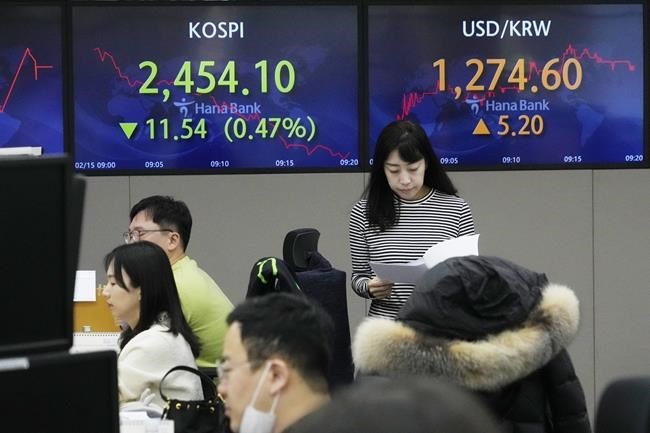TORONTO — Canada's main stock index lost just over half a per cent Thursday amid weakness in energy and technology, while U.S. markets fell further.
The S&P/TSX composite index was down 113.97 points at 20,606.42.
In New York, the Dow Jones industrial average was down 431.20 points, or 1.3 per cent, at 33,696.85. The S&P 500 index was down 57.19 points, or 1.4 per cent, at 4,090.41,while the Nasdaq composite was down 214.76 points, or 1.8 per cent, at 11,855.83.
Markets saw a bit of a slump Thursday, said Lesley Marks, chief investment officer of equity at Mackenzie Investments.
Recent economic data has given further support to a more hawkish approach from the U.S. Federal Reserve, she said, with one or two more rate hikes a certainty, and another one in Canada looking more likely.
Governor Tiff Macklem was bold in the last Bank of Canada meeting when he talked about pausing rate hikes conditionally, but in comments Thursday he left the door open, said Marks.
But due to the Canadian consumer’s sensitivity to interest rates and their effect so far on the housing market, she thinks the central bank won’t change its mind right away.
“House prices continue to fall. We know that Canadians have a significant debt burden, and the Bank of Canada recognizes that. And so they're likely to be cautious about increasing interest rates, until there's more data that supports that,” she said.
While earlier, strong economic data was cause for concern about rate hikes and a recession, now it’s fueling cautious optimism that a soft landing is the most likely scenario, said Marks.
China’s reopening surprise has helped shift that outlook upward, she said.
But the economy isn’t out of the woods yet, said Marks. The past three years have been characterized by unprecedented times, and the current economic environment is unlike what has come before.
“We shouldn't diminish the importance of the unprecedented nature of this economic cycle, because it is fueled by the recovery coming out of a pandemic. And so that's why I say we're in new territory when it comes to the impact of central bank policy,” she said.
The Canadian dollar traded for 74.41 cents US compared with 74.57 cents US on Wednesday.
The April crude oil contract was down nine cents at US$78.74 per barrel and the March natural gas contract was down eight cents at US$2.39 per mmBTU.
The April gold contract was up US$6.50 at US$1,851.80 an ounce and the March copper contract was up 13 cents at US$4.14 a pound.
This report by The Canadian Press was first published Feb. 16, 2023.
Companies in this story: (TSX:GSPTSE, TSX:CADUSD=X)
Rosa Saba, The Canadian Press



